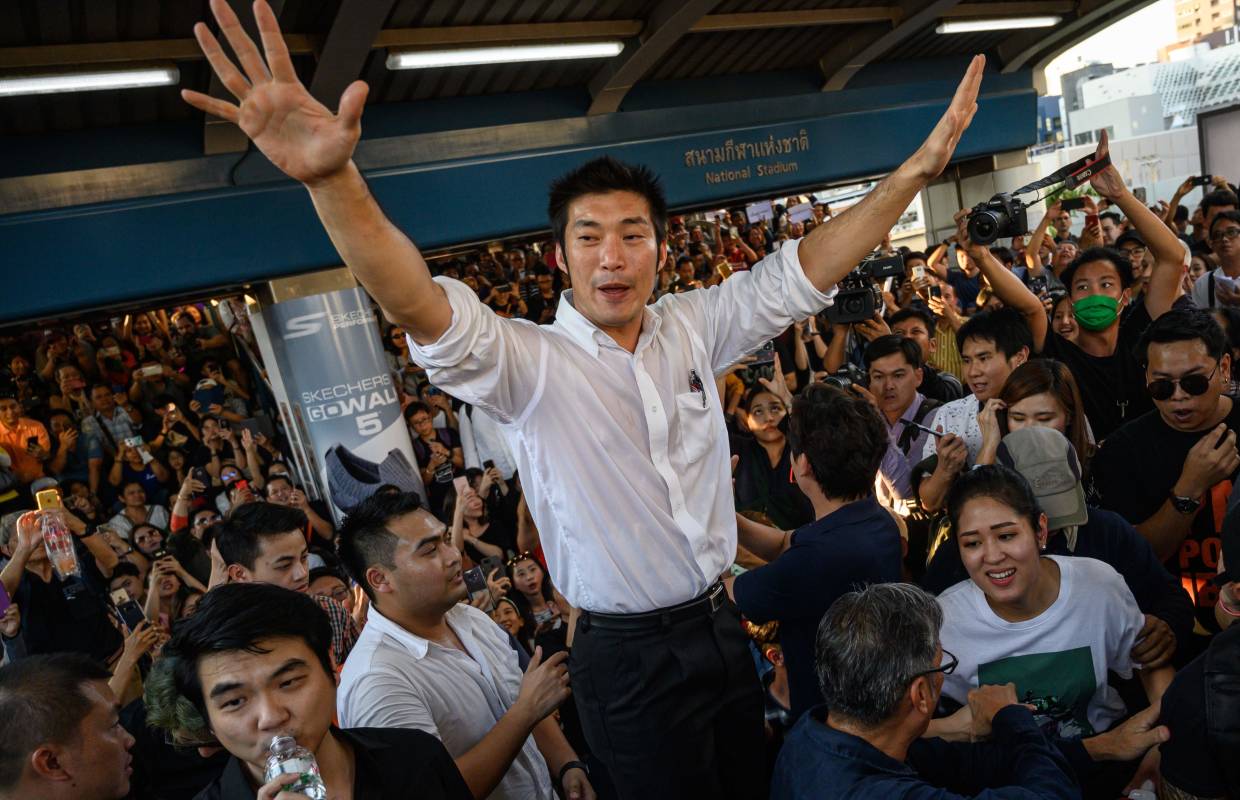On December 14, Thailand saw its largest political demonstration since the 2014 military coup. Several mainstream media commentators downplayed the size and significance of the rally in central Bangkok. However, after over five years of repression under a military dictatorship, the several thousand people who came together and expressed opposition signify the tension building between the current military-backed regime and Thais who want change.
The demonstrators expressed support for the new Future Forward Party (FFP) and its leader Thanathorn Juangroongruangkit. Since its surprise showing in the military junta’s stage-managed March 2019 election, the party has been under constant pressure from the ruling regime. The junta did not expect that a brand-new party, composed mostly of young and a surprisingly diverse group of newcomers, would become the third-largest party in parliament.
For the junta, transmogrified by a rigged election into a military-backed regime with a razor-thin majority, the FFP’s outspoken opposition to the coup, junta, and new regime was an existential threat. It is a threat the regime needs to eliminate.
Tactics to Destabilize FFP
The regime – led by General Prayuth Chan-ocha and a cabinet filled with a clique of former generals and junta functionaries – has used several tactics to destabilize the FFP. Laws put in place by the junta have been used to bring scores of charges against the party and its leaders.
Indeed, the December 14 rally – dubbed a “flash mob” – was called by FFP leader Thanathorn soon after the regime-friendly Constitutional Court had stripped him of his parliamentary seat and the junta-established Election Commission sent a case to that court that promised to dissolve the FFP and ban its leadership from electoral politics for ten years.
The regime has vociferous support from various rightists, ultra-nationalists, and hardline monarchists who have provoked political violence that led to military coups in 2006 and 2014. Most importantly, it has the support of army chief Gen Apirat Kongsompong. An ardent monarchist, he has accused the FFP, its supporters, and opposition parties of communism and wanting to undermine the monarchy.
Only a week after the FFP rally, Gen Apirat declared the country faced a political crisis instigated by “proxies” acting for a “mastermind” seeking to bring down the government. Most commentators assumed he meant the FFP and allied activists working for ousted Prime Minister Thaksin Shinawatra. This outburst was also interpreted as a stern message to the Constitutional Court to hold firm and dissolve the FFP despite the public show of support for the party.
Thailand’s Conservative Political Quagmire
The FFP has displayed considerable energy and optimism into its parliamentary opposition to the regime and is often seen as a representative of a new generation pushing for a more progressive politics. However, the hatred the regime and its supporters have directed towards the party shows that Thailand remains stuck in a conservative political quagmire.
In the late 1990s, a reaction against military interventions saw a push for more fully-fledged electoral politics that embraced long-suppressed political freedoms. The electoral outcome of that push was the election and re-election of Thaksin. His popular power came to be seen by conservatives in the palace, military leadership, and elements of the highly concentrated capitalist class as threatening.
That notion of threat revolved around fears that parliamentary politics were being embedded and was, indeed, popular. Conservatives believed that such political change was undermining “traditional” institutions such as the monarchy and military that are considered keystones for an elite that believes it is the natural ruling class. The 2006 coup was about re-establishing this ruling class’ hegemony.
Country of Coups
Establishing the elite’s preferred political system has been at the heart of every military coup and military-backed regime since the early 1970s. For some 26 of the past 43 years, there have been military and military-backed governments, each one seeking to establish backward-looking authoritarianism euphemistically known as a “democratic regime of government with the King as Head of State.”
The political conflicts unleashed by the 2006 coup and the continuing popularity of Thaksin and his various political parties seemingly confirmed the failure of the elite’s efforts to establish its hegemony with that one coup.
The eventual result was the 2014 coup and an extended period of military dictatorship seeking to embed the elite’s political and ideological supremacy. The regime established a nationwide system where the civilian administration was mirrored and dominated by the military. It also purged the military and bureaucracy of those considered unreliable, replacing them with loyalists. The judiciary was re-made as a political weapon for the regime, and “independent” agencies were made its instruments.
Thailand’s Monarchy
In the most recent iteration of conservative reaction, the military dictatorship has worked hand-in-glove with the King Vajiralongkorn, who came to the throne in 2016, to wind back the political clock.
The king has militarized the world’s wealthiest monarchy and gained constitutional rights and powers that exceed those of any monarch since the end of the absolute monarchy in 1932. His gaze seems firmly fixed on absolutist notions of the throne, and neither the regime nor the military leadership appear to question this political direction, seeing it as reinforcement of the conservative political and economic order.
From the position of the military-backed government, the FFP is simply the most recent threat to that social order. For the rightists, ultra-nationalists, and royalists who support the regime and the conservative legacy it represents, the FFP is yet another proponent of progressive and democratic politics to be defeated. To keep Thailand rooted in authoritarianism, the FFP’s threat to the ruling class and its political and economic power and cultural hegemony must be destroyed.
The question now being asked is whether the legal destruction of the FFP will lead to another round of political conflict.



